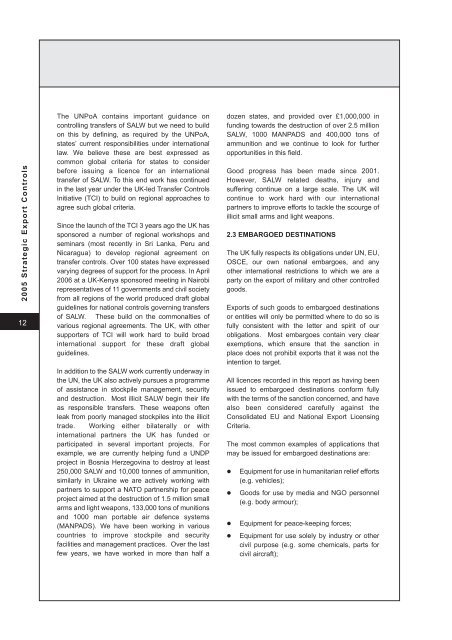Annex A - Official Documents
Annex A - Official Documents
Annex A - Official Documents
You also want an ePaper? Increase the reach of your titles
YUMPU automatically turns print PDFs into web optimized ePapers that Google loves.
2005 Strategic Export Controls<br />
12<br />
The UNPoA contains important guidance on<br />
controlling transfers of SALW but we need to build<br />
on this by defining, as required by the UNPoA,<br />
states’ current responsibilities under international<br />
law. We believe these are best expressed as<br />
common global criteria for states to consider<br />
before issuing a licence for an international<br />
transfer of SALW. To this end work has continued<br />
in the last year under the UK-led Transfer Controls<br />
Initiative (TCI) to build on regional approaches to<br />
agree such global criteria.<br />
Since the launch of the TCI 3 years ago the UK has<br />
sponsored a number of regional workshops and<br />
seminars (most recently in Sri Lanka, Peru and<br />
Nicaragua) to develop regional agreement on<br />
transfer controls. Over 100 states have expressed<br />
varying degrees of support for the process. In April<br />
2006 at a UK-Kenya sponsored meeting in Nairobi<br />
representatives of 11 governments and civil society<br />
from all regions of the world produced draft global<br />
guidelines for national controls governing transfers<br />
of SALW. These build on the commonalties of<br />
various regional agreements. The UK, with other<br />
supporters of TCI will work hard to build broad<br />
international support for these draft global<br />
guidelines.<br />
In addition to the SALW work currently underway in<br />
the UN, the UK also actively pursues a programme<br />
of assistance in stockpile management, security<br />
and destruction. Most illicit SALW begin their life<br />
as responsible transfers. These weapons often<br />
leak from poorly managed stockpiles into the illicit<br />
trade. Working either bilaterally or with<br />
international partners the UK has funded or<br />
participated in several important projects. For<br />
example, we are currently helping fund a UNDP<br />
project in Bosnia Herzegovina to destroy at least<br />
250,000 SALW and 10,000 tonnes of ammunition,<br />
similarly in Ukraine we are actively working with<br />
partners to support a NATO partnership for peace<br />
project aimed at the destruction of 1.5 million small<br />
arms and light weapons, 133,000 tons of munitions<br />
and 1000 man portable air defence systems<br />
(MANPADS). We have been working in various<br />
countries to improve stockpile and security<br />
facilities and management practices. Over the last<br />
few years, we have worked in more than half a<br />
dozen states, and provided over £1,000,000 in<br />
funding towards the destruction of over 2.5 million<br />
SALW, 1000 MANPADS and 400,000 tons of<br />
ammunition and we continue to look for further<br />
opportunities in this field.<br />
Good progress has been made since 2001.<br />
However, SALW related deaths, injury and<br />
suffering continue on a large scale. The UK will<br />
continue to work hard with our international<br />
partners to improve efforts to tackle the scourge of<br />
illicit small arms and light weapons.<br />
2.3 EMBARGOED DESTINATIONS<br />
The UK fully respects its obligations under UN, EU,<br />
OSCE, our own national embargoes, and any<br />
other international restrictions to which we are a<br />
party on the export of military and other controlled<br />
goods.<br />
Exports of such goods to embargoed destinations<br />
or entities will only be permitted where to do so is<br />
fully consistent with the letter and spirit of our<br />
obligations. Most embargoes contain very clear<br />
exemptions, which ensure that the sanction in<br />
place does not prohibit exports that it was not the<br />
intention to target.<br />
All licences recorded in this report as having been<br />
issued to embargoed destinations conform fully<br />
with the terms of the sanction concerned, and have<br />
also been considered carefully against the<br />
Consolidated EU and National Export Licensing<br />
Criteria.<br />
The most common examples of applications that<br />
may be issued for embargoed destinations are:<br />
� Equipment for use in humanitarian relief efforts<br />
(e.g. vehicles);<br />
� Goods for use by media and NGO personnel<br />
(e.g. body armour);<br />
� Equipment for peace-keeping forces;<br />
� Equipment for use solely by industry or other<br />
civil purpose (e.g. some chemicals, parts for<br />
civil aircraft);

















